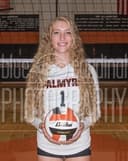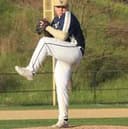Samantha Schury '21 Recruiting Profile

Video
 2020 Senior Year ...
2020 Senior Year ... 2019 Highlights
2019 HighlightsPersonal Statement
When the birth year change occurred in cup soccer, my life was flipped upside down. I was going into my eighth-grade year playing with people I’ve never played with before. My team was split up and I was thrown in with kids who already were playing seniors in high school. There were only a few months difference in age between all of us on the team, but I lacked the experience those freshmen on the team had. I basically lost a year of development but I was forced to either adapt quickly or get eaten alive. At this point in my life, I realized that if I want to play at the next level I had to up my game and fast. Eighth-grade year was a struggle in the beginning but over time I became stronger, and faster to play with the older players. During our State Cup that year, I played a huge part in defeating some of the best teams in the region and winning our first State Championship as a team. Then going into freshman year of high school, I had to step my game up more than I could imagine because there wasn’t much experience on the team and the teams we were going against were experienced upperclassmen teams. This year was another learning year for me. In my freshman season, I learned you have to be skilled, tactically intelligent, determined and take chances to play at the highest level. That year we missed playoffs by one goal. That to me was heart-wrenching. My team at that point has never made playoffs in history and we missed it by one goal. That moment for me was and is my motivation to keep working as hard as I possibly can. My next two high school seasons fed off of that personal motivation and determination to keep getting better and it paid off. In my sophomore and junior season, we made playoffs back to back with placing second in our regular-season games. My cup seasons have also paid off with that determination too, winning State Cup 2 of the 3 years so far and beating some of the best teams in the nation.
I became interested in playing soccer when I was 2 or 3 years old. My dad was a coach for a local boys rec team and I witness first-hand his love for soccer which ended up rubbing off me.
My academic goals for high school are to keep my standards high, meaning keep my grades high like I have and no slacking off. My academic goals for college are to complete a bachelor's degree in either exercise science or biochemistry while keeping my grades at the standards I held myself in high school while staying involved in the community.
There was one specific obstacle that I have had to surpass to get to the point where I am today: fixing my vocal cord dysfunction. When I was younger I always had a difficult time breathing while I was playing soccer. I always had to play in five minutes spurts and then I had to come off and rest and repeat. I was soon put on defense to help prevent me from coming on and off the field. This is when I took measures against my unknown syndrome. So my parents took me to the doctors and they treated me like I had sports induced asthma. They gave me the inhaler and told me to take the inhaler when you felt like there was an attack coming or before I exercise. I listened to what the doctors told me to do and I did this for about a year but it wasn’t working. The doctors then recommend me to get checked by an otolaryngologist and a pulmonologist because they now believed I had VCD/PVFM: Vocal Cord Dysfunction/Paradoxical Vocal Fold Movement. (The inability to breathe because the vocal cords/voice box does not open correctly.) I soon went to UPMC Children’s Hospital of Pittsburgh and talked to the pulmonologist since I couldn't see the otolaryngologists yet. She explained what VCD/PVFM is and gave me exercises to help lessen the syndrome. I began these exercises at home whenever I could and during games when I would have an attack. I began to be able to stay in games longer and play positions I wouldn’t normally play because I couldn’t breathe. About a year later I went to the otolaryngologists to see if I actually had VCD. I performed the pulmonary function test and laryngoscopy which wasn’t very fun but I learned I actually had a very severe case of VCD/PVFM. During the laryngoscopy, I got to see my voice box and how mine was working vs. how it was supposed to work. After this experience, I worked very hard to make myself better and after a few years, I wasn’t experiencing the symptoms anymore and I was playing games without a problem.
I believe possess the characteristics of determination, being calm under pressure, problem-solving, and being a leader in stressful situations through my experiences I went through over the 13 years I’ve been playing soccer.
Athletics
High School Information
- Years w/ Varsity
- 4 years
- Varsity Starter
- 4 years
- 2020 Varsity Team
- Starter
Individual Awards
- Captain, 1st Team All-Conference
Team Awards
- Conference 3rd Place
- 2019 Varsity Team
- Starter- Jersey: #29
Individual Awards
- Most Assist/MVP
Team Awards
- Conference 3rd Place
- 2018 Varsity Team
- Starter- Jersey: #29
Individual Awards
- MVP
Team Awards
- Conference 2nd Place
- 2017 Varsity Team
- Starter- Jersey: #29
Individual Awards
- Playmaker of the Year
Club Information
- Seasons of Club Experience
- 4 seasons
- 2019 Century United (PA) (Cup/Showcase)
- 2018 Century United (Cup/Showcase)
- 2017 Century United (Cup/Showcase)
- 2016 Century United (Cup)
Coach References
- Club Coach
- Dave Gray
Events
- Camp/Event
- Crossroads of America Showcase
- 4/24/20 to 4/26/20
- Camp/Event
- Blue Chip Showcase
- 4/17/20 to 4/19/20
- Camp/Event
- St. Vincent College High School Tournament
- 3/08/20 to 3/08/20
- Camp/Event
- Century Showcase
- 2/15/20 to 2/16/20
- Camp/Event
- Ohio State ID Camp
- 2/08/20 to 2/08/20
- Camp/Event
- Northern Steel Showcase
- 2/02/20 to 2/02/20
- Camp/Event
- WVU ID Camp
- 7/20/19 to 7/20/19
- Camp/Event
- Vanderbilt ID Camp
- 3/10/19 to 3/10/19
- Camp/Event
- The University of Akron ID Clinic
- 7/28/18 to 7/29/18
- Camp/Event
- Region I Championships
- 6/29/18 to 7/03/18
- Camp/Event
- PDA Showcase
- 6/26/18 to 7/28/18
- Camp/Event
- CrossRoads of America College Showcase
- 4/20/18 to 4/22/18
- Camp/Event
- Jefferson Cup College Showcase
- 3/23/18 to 3/25/18
- Camp/Event
- National League
- 3/16/18 to 3/18/18
- Camp/Event
- National League
- 11/30/17 to 12/03/17
- Camp/Event
- Bethesda College Showcase
- 11/10/17 to 11/12/17
Statistics
| Statistic | 2020 Varsity Team | 2019 Varsity Team | 2019 Century United | 2018 Varsity Team | 2018 Century United | 2017 Varsity Team |
|---|---|---|---|---|---|---|
| Goals | 3 | 2 | 5 | 20 | 2 | 12 |
| Assists | 15 | 37 | 14 | 40 | 7 | 21 |
| Shots on Goal | 8 | 8 | 9 | 28 | 6 | 19 |
| Games Played | 14 | 16 | 17 | 16 | 17 | 15 |
| Statistic | 2017 Century United | 2016 Century United |
|---|---|---|
| Goals | 4 | 6 |
| Assists | 12 | 13 |
| Shots on Goal | 9 | 9 |
| Games Played | 19 | 15 |
Academics
Grades
Test Scores
High School Information
Academic Accomplishments
Are you in honor classes?
Yes. Pre-AP/Honors English 9 & 10, Honors Biology, Honors Chemistry, Honors Algebra 2, Honors Geometry, Honors Pre-Calculus, and Pre-AP/Honors World History Introduction to Organic Chemistry HonorsAre you in AP/IB classes?
Yes. AP Statistics, AP Chemistry, and AP Calculus AP Biology AP English Literature AP PsychologyRegistered with the NCAA Eligibility Center?
NoAwards and Activities
- AwardsNational Junior Honor Society, National Honor Society, High Honor Roll, The National Society of High School Scholars, GirlGov Summer Leadership Academy, and The Honor Society Member
- ActivitiesHOSA, Prom Committee, Student Council, Food Pantry, Chick-Fil-A Leadership Academy, Trinity Leaders Committee, and 4-H
Top NCSA Athletes at Trinity High School




Top NCSA Athletes in Area




